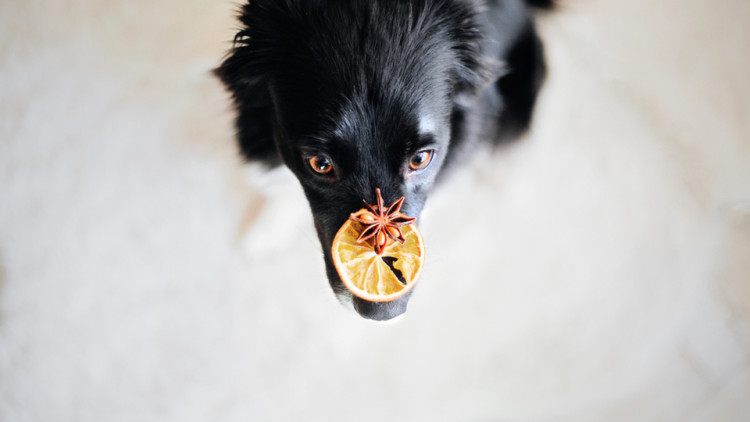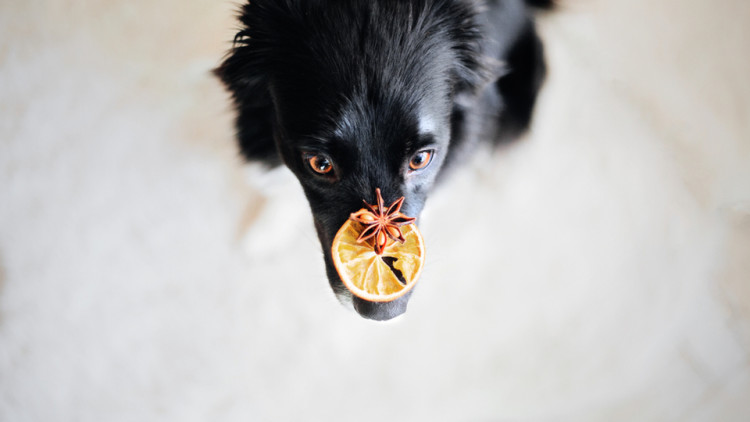The reply is sure, canines can eat oranges, however solely inside motive. These citrus fruits are completely secure, useful even, when correctly fed in reasonable quantities. In case your canine eats too many oranges, they may get an upset abdomen and develop digestive points, amongst different well being issues. Preserve studying to study extra.
Desk of Contents:
- Advantages of oranges for canines
- Are oranges harmful to canines?
- What number of oranges can canines eat?
- Can canines eat orange peels, seeds, and sith?
- Can canines eat mandarin oranges, tangerines, or clementines?
- Can canines eat different forms of citrus fruits?
- What about orange juice for canines?
- A phrase on orange poisoning in canines
- Diagnosing Orange Poisoning in Canine
- Treating orange poisoning
- The best way to serve oranges to your canine
- Key Takeaways
Advantages of oranges for canines
Oranges are wealthy in dietary fiber, potassium, thiamine, and folate whereas being low in sodium. In addition they include excessive ranges of vitamin C, which might increase your pup’s immune system and assist them hold ailments at bay.
Whereas it’s true that pups produce vitamin C on their very own, in case your canine buddy performs a vigorous bodily exercise or is ceaselessly pressured, their liver might not be capable to synthesize vitamin C, so consuming oranges could be useful for his or her well-being. Even when this isn’t the case along with your canine, a little bit further vitamin C will not harm them as it’s a water-soluble vitamin that might be excreted.
Some specialists additionally imagine that vitamin C may assist clear your pup’s abdomen in the event that they get their enamel on extra poisonous meals (like sure forms of nuts). Oranges are additionally an important various to different calorie-rich treats in case your canine companion is chubby.

Are oranges harmful to canines?
Whereas canines of all breeds, sizes, and ages can safely eat oranges, they need to be prevented in canines with diabetes, in addition to in chubby canines. Despite the fact that the pure sugar discovered on this citrus fruit isn’t inherently dangerous, it may well trigger a spike in blood sugar in diabetic pups and might result in surplus energy if given in giant quantities.
The pure sugar, in addition to the acidic nature of oranges, may trigger abdomen upset, so canines with delicate gastrointestinal techniques shouldn’t be fed oranges in any respect. If you’re undecided whether or not your canine greatest buddy falls on this class, provide them a small piece of orange the primary time and see if there’s any response.
Lastly, some pups would possibly discover it tough to swallow oranges if not ready correctly. If orange slices nonetheless have peels or seeds on them, you should definitely take away these components with a purpose to forestall choking points.
What number of oranges can canines eat?
Generally, one or two orange segments a day needs to be sufficient to your pooch. Nonetheless, the breed and measurement of your canine may also have an effect on how their physique digests oranges. Due to this fact, bigger canines can tolerate larger quantities higher than smaller canines. That signifies that German Shepherds and Akitas could possibly eat two to a few orange segments with no downside, whereas smaller breed canines like Pomeranians and Chihuahuas would most likely find yourself with a abdomen upset in the event that they ate the identical quantity.
As well as, though treats mustn’t make up greater than 10% of your pet’s day by day calorie consumption, the identical quantity of orange would comprise the next proportion of a small pup’s day by day calorie consumption in comparison with a much bigger canine.
Puppies may eat oranges, however they may be extra vulnerable to gastrointestinal upset than grownup canines. For that motive, it’s beneficial to supply puppies very small quantities of orange, with the seeds and peels eliminated.
Oranges are additionally wealthy in dietary fiber, so in case you feed them to your furry buddy in giant quantities, they will trigger digestion points. In case your pet has a delicate digestive system, watch out how a lot orange you might be feeding them. When you discover vomiting, diarrhea, or different uncommon conduct after giving your canine oranges, you need to cease without delay.
In case your pup eats too many oranges and also you discover something out of the unusual, make sure that to contact your vet immediately.
Can canines eat orange peels, seeds, and pith?
Canine ought to keep away from consuming orange peels and seeds as these components of the fruit can doubtlessly include hint quantities of sure poisonous compounds. Make sure that to totally take away the seeds earlier than providing orange slices to your pooch, as they can be a possible choking hazard.
In relation to orange peels, despite the fact that they’re not poisonous to canines, orange peels are tough to digest and might trigger abdomen upset. In excessive circumstances, orange peels would possibly create a harmful (and doubtlessly life-threatening) blockage of their gastrointestinal tract, which may require emergency surgical procedure.
Alternatively, the orange pith (the white layer between the rind and flesh) is full of dietary fiber and antioxidants. Additionally it is freed from sugars and acid, which signifies that it gained’t upset your pet’s abdomen. So long as the pith is faraway from the peel, it’s probably the most useful a part of the fruit.
Professional tip: The fee for analysis and therapy of gastrointestinal points can range from $200 – $8,000. In case your canine has pet insurance coverage, you would be reimbursed for as much as 90% of this price, relying in your coverage.
 (Picture supply: PetMD)
(Picture supply: PetMD)
Can canines eat mandarin oranges, tangerines, or clementines?
Sure, canines can safely eat these citrus fruits as long as they’re peeled and fed in reasonable quantities. Mandarin oranges are considerably flat on the ends and have a barely completely different taste than commonplace oranges. Clementines and tangerines each belong to the group of mandarine oranges, so the identical guidelines apply as they do for normal oranges.
Observe that mandarins, tangerines, and clementines are considerably sweeter, so it’s essential to be further cautious with diabetic and chubby canines. It’s greatest to solely feed these citrus fruits to canines which can be in a superb state of well being. As a rule of thumb, feed not more than a half of clementine or tangerine for smaller canines and entire fruit for bigger canines in a given day.
Can canines eat different forms of citrus fruits?
The fleshy a part of citrus fruits like lemons, grapefruits, and limes is secure for canines however most pooches don’t like them as a result of they’re very acidic and tart. The seeds and peels of all citrus fruits current a choking hazard and may trigger gastrointestinal points.
What about orange juice for canines?
Whereas juicing oranges could be a solution to keep away from a choking hazard, orange juice is just not good to your canine. Orange juice – even when it’s freshly squeezed – is a concentrated supply of citric acid and pure sugars discovered within the fruit. Canine ought to keep away from sugar on the whole as a result of it may well trigger a variety of well being points, and the acidic content material of orange juice can destroy tooth enamel over time. If you wish to hold your four-legged buddy hydrated, water is the most suitable choice.
A phrase on orange poisoning in canines
As talked about earlier, oranges are hardly ever poisonous to canines except they’re consumed in giant quantities. The primary toxicity is within the peel, which can be a choking hazard as a result of it’s very thick and tough to digest.
The most typical scientific indicators of orange poisoning in canines embrace:
- Diarrhea
- Vomiting
- Drooling
- Muscle tremors and spasms
- Weak point
- Intestinal obstruction
- Despair
Diagnosing orange poisoning in canines
To diagnose your canine, the vet will carry out a bodily examination. They could additionally use an endoscope with a purpose to test for obstructions or irritation in your canine’s throat, higher airway, and esophagus. If there’s any overseas materials, the vet will insert a device with a purpose to take away it.
In case your pet is exhibiting any sort of cardiac signs, an electrocardiogram (EKG) may be carried out to test for any abnormalities. Urine and blood exams might be run as properly, together with blood glucose, serum biochemistry profile, and CBC. Extra exams that may be wanted are CT scan, ultrasound, x-rays, and MRI.
Treating orange poisoning in canines
Treating orange poisoning is just like different circumstances of poisoning, which embrace:
- Eliminating the poison by giving an emetic (ipecac or peroxide) with a purpose to induce vomiting, in addition to activated charcoal to soak up any toxins which can be left.
- Cleansing. The vet would possibly carry out a gastric lavage with a purpose to rinse away any undigested fruit residue. IV fluids may even be given to rehydrate the animal and flush their kidneys.
- Treatment. The vet will doubtless give your pet antiemetics in the event that they’re nonetheless vomiting and abdomen protectants for gastric misery.
Generally of orange poisoning, hospitalization is just not essential, so your vet will most likely ship you dwelling after therapy. Observe your pet’s restoration and conduct within the first few days after therapy and ensure to offer sufficient recent water together with meals that’s simple to digest.
The best way to serve oranges to your canine
When feeding your canine oranges, you should definitely peel them and take away the seeds. Don’t give the entire fruit and as an alternative, divide it into segments.
You possibly can add orange slices right into a blended salad fabricated from dog-friendly fruit and veggies similar to apples, carrots, cucumber, and celery. You can even use some orange juice as a dressing.
Another choice is to freeze orange segments and feed them along with your pooch as a refreshing summer season snack.
Avoid store-bought orange juices and different orange-flavored snacks and drinks as they’re stuffed with synthetic sugars and are very dangerous to your pup’s well being.
